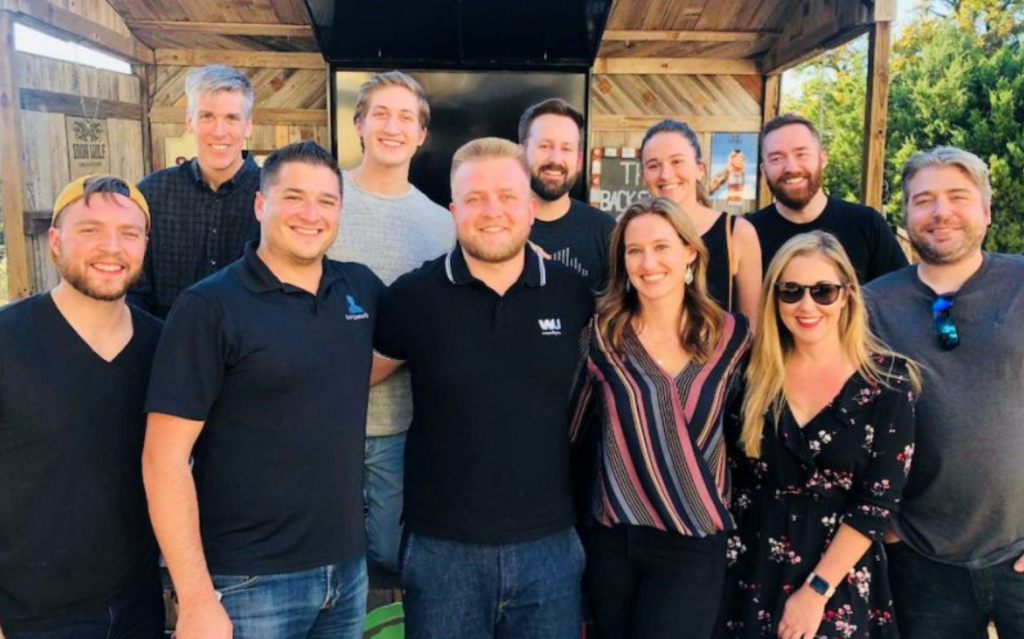The demand for artificial intelligence specialists is exploding; over the past four years, hiring growth for AI engineers has skyrocketed by 74% annually. This surge isn’t without reason since, according to McKinsey, 66% of companies report increased revenue thanks to AI technology.
WeSoftYou provides AI development services, engaging with numerous AI engineers. Based on this experience of collaboration with multiple specialists, we want to share our insights on how to effectively hire AI talent in this comprehensive step-by-step guide.
Understanding the Role of an AI Engineer
Before diving into the hiring AI engineer process, it’s crucial to have a clear understanding of what these specialists do. Below is a brief overview.
Key AI Engineer Responsibilities
Within an organization, AI engineers’ responsibilities include:
- Developing and implementing AI models and algorithms.
- Collecting and analyzing data to train AI systems.
- Collaborating with cross-functional teams to integrate AI technology into existing systems.
- Optimizing and fine-tuning AI models for enhanced accuracy and performance.
- Staying up-to-date with the latest advancements and trends in AI technology.
Nonetheless, an artificial intelligence engineer’s job responsibilities are more than just writing code. A good specialist also strongly understands the business context in which they operate. By aligning AI solutions with the organization’s goals and objectives, AI engineers can ensure that their work has a meaningful impact on the overall success of the company.
Essential Skills for an AI Engineer
To ensure you hire the right AI engineer for your organization, it’s essential to identify the key skills required for the role. Here are some of the essential skills that top AI engineers possess:
- Strong programming skills in languages such as Python, R, or Java.
- Proficiency in machine learning algorithms and frameworks.
- Expertise in data manipulation, visualization, and analysis.
- Knowledge of natural language processing (NLP) and computer vision.
- Strong problem-solving and analytical abilities.
- Excellent communication and collaboration skills.
AI engineers are not just technical experts; they are also effective communicators and collaborators. They need to be able to explain complex concepts to non-technical stakeholders and work closely with teams from different departments. By fostering effective communication and collaboration, AI engineers can ensure that AI projects are successfully implemented and deliver value to the organization.
The Importance of Hiring AI Engineers
Now that you have a clear understanding of the role and responsibilities of AI engineers, let’s explore how to hire an AI developer who will empower your business.
AI engineers play a pivotal role in shaping the future of technology within your organization. Their expertise in artificial intelligence and machine learning can drive innovation and revolutionize the way your business operates. It’s not surprising that 83% of companies claim AI is a top priority in their business plans in 2024.
Advantages of Having AI Engineers on Your Team
Having AI engineers on your team can provide numerous advantages, such as:
- Accelerated innovation by leveraging AI technology.
- Increased operational efficiency through automation of manual tasks.
- Enhanced data-driven decision-making capabilities.
- Improved customer experiences through personalized recommendations.
- Gaining a competitive edge in the market by staying at the forefront of AI advancements.
Furthermore, AI engineers bring a unique perspective to problem-solving within your organization. Their ability to analyze complex datasets and develop cutting-edge algorithms can drive efficiency and optimize processes across various departments.
The Impact of AI Engineers on Business Growth
The implementation of AI technology can have a profound impact on your business growth. AI engineers can help unlock valuable insights from your data, leading to improved strategies, optimized processes, and increased revenue. By harnessing the power of AI, you can propel your organization forward and outpace your competitors.
Moreover, AI engineers can collaborate with other teams within your organization to drive cross-functional initiatives that drive growth and innovation. Their expertise can bridge the gap between technical capabilities and business objectives, ensuring that AI solutions are aligned with your overarching goals. By fostering a culture of AI-driven innovation, you can position your organization as a leader in your industry and drive sustainable growth over the long term.
Preparing for Hiring an AI Engineer
When embarking on the journey to hire an AI engineer, it’s crucial to approach the process strategically and thoughtfully. Beyond just filling a position, you are seeking a visionary individual who can drive your company’s AI initiatives to new heights.
Identifying Your Company’s AI Needs
Before beginning the hiring process, it’s crucial to identify your organization’s specific AI needs. Understanding the intricacies of your business operations and where AI can make a substantial impact is key. By conducting a thorough assessment, you can pinpoint the exact areas that could benefit from AI applications, whether it’s streamlining processes, enhancing customer experiences, or optimizing decision-making.
Setting a Budget for Hiring an AI Engineer
“How much does it cost to hire an AI developer?”, this is the first question when thinking about extending your IT team. But the answer is “it depends”. Hiring top AI talent comes at a cost, so setting a budget is essential. Investing in AI expertise is an investment in the future of your company, and it’s crucial to allocate resources wisely. Researching average industry salaries for AI engineers and understanding the market demand for such talent can provide valuable insights into setting a competitive budget.
How much do ai engineers make? We’ve compiled a comparison table with average hourly salaries depending on the region and seniority level:
| Country/Region | Junior AI Developer (USD per hour) | Middle AI Developer (USD per hour) | Senior AI Developer (USD per hour) |
| USA | 75-100 | 100-150 | 150-200+ |
| Canada | 60-80 | 80-120 | 120-160+ |
| UK | 55-75 | 75-100 | 100-130+ |
| Germany | 60-80 | 80-110 | 110-150+ |
| India | 20-30 | 30-50 | 50-80+ |
| Australia | 65-85 | 85-120 | 120-150+ |
| China | 25-35 | 35-55 | 55-80+ |
| Brazil | 30-45 | 45-70 | 70-100+ |
| Eastern Europe | 30-40 | 40-60 | 60-90+ |
Moreover, beyond the base AI engineering salary, consider other factors such as benefits, professional development opportunities, and potential performance bonuses.
The Hiring Process for AI Engineers
Now that you are prepared, it’s time to dive into the hiring process.
Where to Hire an AI Developer
Finding qualified AI engineers can be a challenging task. Start by leveraging your professional network, attending industry conferences, or partnering with reputable recruitment agencies specializing in AI talent. Additionally, consider reaching out to universities or participating in AI-focused recruitment events to connect with emerging talent.
Exploring online platforms and AI-specific communities can also be fruitful in identifying top talent. Websites like GitHub, Kaggle, and AI-focused forums serve as hubs for AI enthusiasts and professionals, offering a wealth of information and networking opportunities.
Crafting an Effective Job Description
An effective job description is crucial for attracting qualified AI engineers. Clearly outline the role’s responsibilities, required qualifications, and any specific AI technologies or tools the candidate should be proficient in.
Your AI engineer job description should contain the following points:
- Clear and concise title (e.g., Junior AI Developer, Senior Machine Learning Engineer).
- Brief summary of the role.
- Examples of projects or types of problems the candidate will work on.
- Specific technical skills (e.g., Python, TensorFlow, PyTorch).
- Experience with AI/ML algorithms, data processing, and model training.
- Educational requirements (e.g., degree in Computer Science, Data Science, or related field).
- Years of experience required for the role.
- Additional skills or experience that are advantageous (e.g., experience with cloud platforms like AWS, Azure, or GCP).
- Knowledge of specific domains or industries (e.g., healthcare, finance).
- Specific AI frameworks and libraries.
- Experience with data visualization tools.
- Problem-solving abilities.
- Communication skills.
- Team collaboration and interpersonal skills.
- Description of the team and company culture.
- Work schedule (e.g., full-time, remote, hybrid).
- Salary range.
- Benefits package (e.g., health insurance, retirement plans).
- Any additional perks (e.g., professional development opportunities, flexible working hours).
- Office location or remote work options.
Screening and Interviewing Potential Candidates
When screening potential candidates, focus not only on their technical skills but also on their problem-solving abilities, creativity, and cultural fit within your organization. Conduct thorough technical assessments, evaluate their previous projects or research papers, and engage them in real-life problem-solving scenarios. The interview process should include multiple rounds with key stakeholders to ensure a comprehensive evaluation.
To make things more simpler for you, we’re sharing our list of AI engineer interview questions:
- What are your preferred programming languages for AI development, and why?
- What AI/ML frameworks and libraries do you have experience with (e.g., TensorFlow, PyTorch)?
- Can you explain the difference between supervised, unsupervised, and reinforcement learning?
- How do you handle missing or corrupted data in a dataset?
- How do you select the right algorithm for a given problem?
- What techniques do you use to prevent overfitting in a model?
- How do you handle large datasets and ensure efficient processing?
- Explain how you preprocess data before feeding it into a machine learning model.
- Can you describe a situation where you had to clean and preprocess a complex dataset?
- How do you evaluate the performance of a machine learning model?
- What steps do you take if your model’s performance is not satisfactory?
- Can you describe a time when you had to optimize a model’s performance?
- Describe a challenging AI problem you solved. What was your approach?
- Have you ever deployed a machine learning model into production? What challenges did you face?
- Describe a situation where you had to troubleshoot a complex issue in an AI project.
- Imagine you are given a dataset with thousands of features. How would you go about feature selection?
- You have trained a model, but its performance on the validation set is poor. What steps would you take to improve it?
- Can you walk me through a specific AI project you are proud of? What was your role, and what impact did it have?
- How did you handle any challenges or setbacks during this project?
Onboarding Your New AI Engineer
Congratulations, you’ve found the perfect AI engineer to join your team! Now it’s time to onboard them effectively.
Integrating the AI Engineer into Your Team
Integrating your new AI engineer into your existing team is crucial for their success. Assign a mentor or a senior team member to guide and support them during their initial days. Encourage collaboration and open communication within your team to foster knowledge sharing and idea exchange.
Consider organizing team-building activities or lunch sessions to help your AI engineer build relationships with their colleagues. Creating a supportive and inclusive team environment can boost morale and productivity, leading to better outcomes for your projects.
Setting Expectations and Goals
Clearly define expectations and goals for your AI engineer. This includes setting project-specific objectives, outlining milestones, and providing feedback on their performance. Regularly evaluate their progress, offer constructive criticism, and recognize their achievements. By establishing clear expectations and goals, you set the foundation for a successful working relationship.
Retaining Your AI Engineer
Retention of AI engineers is vital to ensure continuity and maximize the value they bring to your organization. As the demand for AI expertise continues to grow, it becomes increasingly important to implement strategies that promote long-term retention.
Providing Continuous Learning Opportunities
AI is a rapidly evolving field, and it’s crucial to provide your AI engineer with continuous learning opportunities to stay updated with the latest advancements. Encourage them to attend industry conferences, take part in online courses, and join AI communities to broaden their knowledge and skills.
Ensuring Job Satisfaction for Long-Term Retention
Creating a positive work environment and fostering job satisfaction are instrumental in retaining your AI engineer. Offer competitive compensation packages, provide a healthy work-life balance, and recognize their contributions. Encourage a supportive and inclusive culture that values diversity, promotes collaboration, and fosters creativity.
Struggle to Find Your Ideal AI Developer? WeSoftYou Can Help
Finding the right AI developer can be challenging, but WeSoftYou is here to make it easy. We offer two key services to meet your needs: IT staff augmentation and dedicated teams.
- IT Staff Augmentation allows you to quickly add top AI talent to your existing team for short-term projects or specific skill requirements. This flexible solution helps you scale your team up or down as needed without the long-term commitment of full-time hires.
- Dedicated Team provides you with a fully committed, long-term team focused exclusively on your project. This option is ideal for large or ongoing projects that require a stable and integrated team working consistently towards your goals.
At WeSoftYou, we pride ourselves on hiring the top 3% of AI talent. This ensures that you receive the highest quality expertise and innovation, giving your projects the competitive edge. Whether you need a temporary boost or a full-scale development team, WeSoftYou has the right solution to help you succeed.
Conclusion
As you embark on the journey of hiring AI engineers for your organization, remember that it’s a process that requires careful planning, thorough screening, and effective onboarding.
At WeSoftYou, we understand the challenges and opportunities that come with integrating AI into businesses, and we are here to support you on this journey.
Contact us if you want to fuel your AI projects with top 3% of talents and choose the best collaboration model.
Frequently Asked Questions (FAQ)
Assessing the technical skills of an AI engineer can be done through coding tests and practical assignments related to real-world AI problems. Additionally, ask candidates to explain their approach to solving these problems and discuss their experience with past projects.
The level of AI engineer you should hire depends on your project’s complexity and needs. Junior engineers are cost-effective for simpler tasks, middle-level engineers offer a balance of experience and cost, while senior engineers bring extensive expertise for complex, high-stakes projects.
Industry-specific experience can be beneficial, especially for projects with unique requirements. However, strong foundational AI skills and the ability to learn quickly are often more important.
If finding the ideal AI developer proves difficult or costs are too high, consider alternative solutions such as hiring remote developers from regions with lower costs, providing training to existing staff, or leveraging IT staff augmentation to access specialized skills temporarily. Additionally, reevaluating the project scope to align with available resources can also be beneficial.
IT staff augmentation provides flexibility, allowing you to scale your team up or down based on project demands. It also enables you to fill specific skill gaps without the long-term commitment of hiring full-time employees.






















